|
|
(Updated 4th January 2010) Going through my analytics, people are coming to my blog with some questions not really covered in my blog. Here is a collation of the most frequently asked questions with my best answers. Again, note that this is an unofficial CORS guide. CORS FAQ
 - Does the NUS CORS system suck?
Not really. Only when the bidders exceed the vacancy, the closing period sucks as we don't know how much to bid.
- How do I check the CORS results? When will it be released?
Usually by 8pm on the same day of round closing, the results will be sent to your NUS mail. Sometimes, it can (and has) taken up to 1130pm.
- How can I get more points in CORS?
Two avenues - Online Student Feedback Exercise (100 points) and CORS Survey (30 General points). Notifications to take them will be sent to your NUS e-mail when the time arrives.
- What do the different CORS rounds mean?
Go here, scroll all the way to the bottom and download the file under 'Here are the detailed bidding round descriptions and activities'
- When should I start bidding for my modules?
Get the modules as early as possible. If not the MPE (link for SOC students) exercise, secure it during round 1 as the fight for popular modules can get tougher in the later rounds with more competition.
- Can I really plan my own timetable in NUS?
Quite hard to believe that too when I entered NUS, but yes, you can, and you have to. Use the TimeTable Builder to assist you. Be sure to select the correct year and semester! There is one unofficial timetable [outdated?] here and a more recent one here. As with every downloadable software, take security precautions. I have NOT used them personally and am providing links only for those adventurous ones.
- Are there any cheats in CORS?
Of course not, but see my CORS posts for many tips.
- What is the CORS Opening Period?
This is how all rounds start - the opening period. You will be able to see the highest bid points, minimum winning bid and lowest bid for a module once you add the module. Until the closing period comes in...
- What is the CORS Closing Period?
Due to the occurrence of bidders hitting the Refresh key non-stop in the last few minutes, NUS has come up with this 'innovative' strategy of hiding the highest bid points, minimum winning bid and lowest bid in the last few hours of the round. That last few hours is called the 'closing period'. See my post for more information on it.
- Any strategies or tips for getting the tutorial slots I want?
Not much for the first round as it involves only ranking your choices without any information on the current number of balloters. In the later rounds where you are allowed to add/drop your assigned tutorial slot or request Swap slots, do it as early as possible. This means, do it at the time the round opens. This strongly increases your chances to get the desired slot or to get the first slot in the queue for swapping.
- How do I declare my major and minor?
Once you login to CORS, you will be prompted to declare.
- How do I drop a module when I can't access CORS?
Wait for CORS to open if bidding rounds are ongoing. CORS will also be open during the term time after the bidding and tutorial rounds have ended to allow you to drop modules. Note that dropping modules after the 2nd week awards you a W grade in your transcript and dropping a month later than that awards you a 'F' grade and you can't S/U it. See here under Bidding Schedule for 'X grade takes effect from..'. for the exact dates.
- How do I ensure my modules don't clash in the time table and exams?
Use the NUS TimeTable Builder. Note that you cannot bid for a module in CORS if its timetable or exam dates clash with any of the modules you already have or are bidding for.
- Where do I bid or ballot for tutorials?
Once you login to CORS, there is a section for you to ballot and rank your tutorial slots if the round is open. Check the CORS schedule (under 'Tutorial Schedule') for the starting and ending times, as some rounds end as early as 12pm.
- How many points should I bid for a module?
This is a decision you should take independently as there is no one size fit all. See my posts for some CORS tips.
- How does the CORS tutorial balloting work?
Here's the description by CORS. You just need to rank your choices of tutorial groups. No, the first round (and only the first round) is NOT first-come-first-serve basis. You will be given a total of 20 ranks. In CORS, when the balloting is open, place the first rank for the tutorial slot you want most, 2nd rank for the tutorial you want 2nd, and so on. No need to use all 20 ranks.
It is your responsibility to check that the slots you choose do not clash with any lectures or tutorials you already have if not you will not get the slot and lose the rank. CORS does NOT check for clashes when you rank your tutorial groups. After the round is over, the vacancy level of the groups will be published in the main CORS just like the ending of the Opening period in CORS bidding.
In the next round, you are now allowed to instantly add/drop tutorial slots provided there are vacancies. This is a first-come-first-serve basis so be there sharp when the round opens if you want to go to a tutorial with vacancies.
Then there's the Swapping round. You place a request e.g. 'I want to swap Tutorial Group A with Tutorial Group B' - then you wait for someone else to do the same. Once someone has a similar request, you swap tutorial slots with the other person. Otherwise, you wait and try your luck. This is a first-come-first-serve basis as well.
- So how does the NUS CORS tutorial ranking assign the vacancies after I ranked my choices?
Here's a simple guide on how the tutorial balloting is done in CORS. Take for example, there is Student A, B, C and D balloting for a tutorial group Z with only 3 vacancies. Student A and C placed tutorial group Z as first choice. Student B and D placed it as 2nd choice with the first choice for other tutorial groups. This is how it will go:
- CORS will process all the first ranks first. It will see that a total of two students have placed it as first choices. Since it did not exceed vacancy, it assigns Student A and C two slots in tutorial group Z.
- Now CORS processes the 2nd ranks. Uh oh, looks like two students (B,D) have placed it as 2nd choices while only 1 vacancy is left. What happens now is that CORS randomly assigns one student the winning seat.
- In the end, Student A and C get their first choice. Student B gets his 2nd choice due to him winning CORS's random algorithm. Student D loses his 2nd choice preference.
So you can see that your first choice if it exceeds vacancy of the total number of balloters who also indicated it as first choices, does not guarantee you a place in the tutorial group. It's a somewhat random way of assigning tutorial groups that you can guide the direction by ranking your choices. No information on the number of balloters is released until the round is over. See another guide here.
- How do I find the available tutorial groups for my module?
It is in the CORS Module Detailed Information module listing. The tutorial code is indicated in square brackets in the first line.
- If the exam for module A is in the afternoon and exam for module B is in the evening, will it clash?
Generally: Morning exam - 9am. Afternoon - 1pm. Evening - 5pm. Two hours each paper, generally.
Some papers have odd timings and lengths. Check the list for Semester 1 or Semester 2 for the exact exam date and time.
- What does getting a 'W' grade in my NUS transcript mean for dropping a module late?
Pretty much thats it. It won't affect your CAP. The only thing it does is an entry appears in your transcript stating that you got W for the module. A crude way to discourage students from wasting NUS module resources for the additional one month.
- When can I start overloading my module allocation?
In CORS, this is sometimes referred to as "accelerate". Both refer to taking modules more than you are allowed to in the first two rounds. This is usually 20 MCs.
Normally this is allowed from Round 3 onwards. You can get the information from here. Scroll to the bottom and click on the links below the paragraph that says "Here are the detailed bidding round descriptions and activities". Look for the keyword "accelerate" under the round description.
- When do I start bidding for my Singapore Studies modules?
Normally, from Round 2A onwards. You can get the information from here. Scroll to the bottom and click on the links below the paragraph that says "Here are the detailed bidding round descriptions and activities". Look for the keyword "SS" in the round description header.
- When do I start bidding for my GEM modules?
Normally, from Round 2A onwards. You can get the information from here. Scroll to the bottom and click on the links below the paragraph that says "Here are the detailed bidding round descriptions and activities". Look for the keyword "GEM" in the round description header.
- My CORS results says "Outbidded"! What's next?
If you have been outbid, the module has not been allocated to you. Bid for it again in the next round if there's slots for it, or consider other module options. If slots are available in the next round, expect competition to be very tough as there will also be other people like you who may want to rebid for the module.
You may also want to wait for Round 3 onwards, where all vacancies are combined to one. Check the bidding statistics to see whether there are reserved slots for freshmen and the popularity of them.
- What is Round 0 for?
Round Zero is for placing advance bids for the next eligible round you can bid the module for. No actual bidding goes on during this round.
- I can't login to CORS / I forgot my NUS username and password? How do I reset it?
Go here.
Any corrections let me know in the comments below.
(Updated 15th August 2009) Going through my analytics, people are coming to my blog with some questions not really covered in my blog. Here is a collation of the most frequently asked questions with my best answers. Again, note that this is unofficial. 
- Does NUS School of Computing (SOC) suck?
Depends on the modules you take. Some modules have lecturers who you may have trouble understanding their accent. Some lecturers like randomly picking from the audience and asking questions.
There was one module where we HAD to flood the external presenter with questions in order to get class participation marks. And it's not consistent every year so module reviews that you get from other students will be outdated as the module is changed according to the feedback or lecturers changing. Plus, tutors are mostly graduate students who sometimes may not be really interested in teaching. Many many variables here...
- So what are the easy modules for me to take in NUS?
For computing students, CS1105: Computing and Society and GEK1531: Introduction to Cybercrime are very popular. GEK1531 may not be for you if you are not into internet hacking and don't understand how the internet works. Plus, it is a high demand module in CORS for usually about 800 points from General. IT1001 is also popular for non-SOC students looking for a breadth module. High point module too.
For the rest, unfortunately, how 'easy' a module is depends on what you already know. Your friend may say it is a easy module, but that could be because he/she already has experience on it. However, don't worry. You will learn about more the choices of modules that you can take from your friends as time passes. They are the best information source as they have taken the modules recently and you get the latest information on how the module is and what it covers.
- How do I check my status of my graduation for SOC students?
Go here and you can access the File For Graduation Degree Verifier.
- Why do I have a UNIX e-mail account too?
I don't know too. Perhaps to show the geekiness of SOC students and I too find it a hassle to manage TWO e-mail accounts in SOC in addition to the primary one I already have. Three passwords to remember! Plus, the password complexity requirements for the UNIX accounts way exceed even the security of my Blogger account.
Fortunately, you can forward all e-mails sent to the SOC UNIX account to your main account here and forget about this stupid UNIX email account. Heck, you can even forward your NUS account to your GMail account or setup auto forwarding in your NUSNet account.
- How do I login to mySOC?
Go here. Use your matric number (e.g. U0910121) and password. No need to specify the NUSSTU domain.
- Where can I get the list of modules being taught in SOC?
Right here.
- Is it true that SOC students have a free grayscale laser printing quota?
Yes, you have about 50 grayscale pages of quota. If you print double sided (i.e. not use the -sx suffixed printers), you can print 1.5 times more!
Unfortunately, I can't find any online Windows guides to adding the printers for connecting your laptop. Suffice to say that you need to be on SOC's VPN network (or NUS wireless network) and must already have a UNIX account. Then go to Control Panel > Printers > Add Printer > Network Printer > enter '\\nts27\' under 'connect to this printer (or browse for a...' > next > select the printer to print to. If you are still having trouble, bring your laptop to your Technical Support Desk located in SOC near the main entrance.
Note that you don't need to connect to printers manually if you are using SOC lab computers. But you will still be using your assigned quota when printing from workstations. Your UNIX id is automatically detected when you login with your NUSNET username to these workstations.
Print test prints with single pages before printing away the whole lecture slides. You will notice the first page is always your UNIX id in big letters so as to separate print jobs of other users. Get comfortable with how the printing works before sending bigger jobs to the printers as you don't much quota to play with. Yes, paper is included in the quota. Yes, you can buy more quota via mySOC (or direct link). Printer names with a SX suffix means they will only print single side. Printers with DX suffix means they will print double side.
By the way, the 500+ line printing quota you get is for the noisy printer near the technical support office and used to print only text files. I heard it is mainly used to print source code out. The paper is also not standard 80gsm paper.
- How do I check my SOC remaining print quota?
Go here.
- How do I apply for a NUS SOC UNIX account?
Go here. Be prepared to meet a ridiculous .. nah .. impossible ..nah .. ridiculously impossible password complexity requirement to create your UNIX account.
- I forgot my UNIX / mySOC password! How do I reset it?
Go here.If you need to login, use your NUSNET credentials i.e. u0910232 / password. You will need your matric card.
Any corrections let me know in the comments below.
So you want to win your modules in Centralised Online Registration System? You want to use at little points as possible. And you want to secure the modules with as few points as possible. 
Mr. CORS. We meet again. For the last time...
This post summarizes some knowledge from my experience before it expires into long term memory. Many of them can sound bad and going against general bidding ethics. Make sure you have planned your timetable with NUS Timetable Builder. You cannot bid for a module if its timetable or exam dates clash with any of the modules you already have or are bidding for. Have some backup replacement modules and don't fix on just 5 modules. And yes, you can have fun with CORs as well. - Treat it like eBay
CORS is like eBay. Except that it has a stupid thing called Closed Bidding Period, where you can only see the number of bidders in the final few hours.
But you can withdraw bids without *any* penalty. Now that opens up many more doors. Retraction of bids in eBay is recorded in your feedback but in CORS, there's no penalty..

EBay, where all snipers are bred and trained.. (Image stolen)
Which is why, many eBay tricks can be applied in CORS. They will be elaborated on below.
- Take popular modules later when you have more points
This you should already know. Especially if you are a freshie. Just like when something you are watching reaches too high a price, you forget about it and wait for another to show up. As a freshie, you have so many modules that you can bid for. And as the years goes by, your choices of modules will get lesser and lesser.
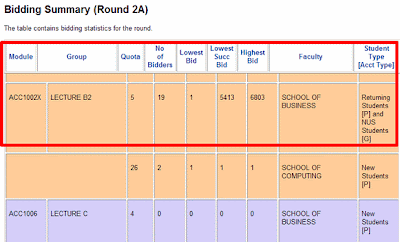
Hope those 5 winners are in their last semester, they just squandered 90% of their points when the New Student slot still has 24 left... [source]
A lot of seniors will recommend planning ahead for your full term in NUS. For me, I don't recommend this. Why? Because as you spend more time in NUS, you will find new modules that you have never heard before. As a freshmen, how many modules would you have known already? That's why I did planning only in my 3rd year.
- Selecting Modules When You Are a Freshie
Don't take the easy modules like CS1105 when you are starting off. You can always take these modules later and not many modules require them as a pre-requisite. If the demand exceeds vacancy, think of switching to other modules.
For the first few semesters, mix modules that you can get for one point as having a major share in the modules you need to take for the semester. For example, for your first semester of your first year, you can take 1 popular module and 4 unpopular ones.
If the module's demand exceeds by about 10% in CORS by the end of the open round (Trust me many of them won't follow rule #4), consider seriously replacing it with another module. Like saving money in the bank, you want to save points for future use as CORS does not delete points every semester.
That doesn't mean you should drop the module the moment it exceeds demand. Some modules always require mandatory fighting for it as its demand always exceeds vacancy. For these kind of modules, try to take them later when you have more points.
When the number of vacancies for the module are alot, like 50+, 100+, chances are high that you won't have to spend too many points to get it, but don't put just one point! Put your maximum you are willing to pay for it. There will definitely be a few bidders who put only a few points.
- Bid only at the Last Minute
Known on eBay as sniping. Place your bids only in the last 10 minutes of the round.

Being a sniper is not easy with all these preparations. And be careful not to miss the deadline (Image stolen)
Until then, leave it at zero points. Placing even a single point will increase the number of bidders by one - this is updated realtime even during the closed bidding period. Several pros and cons
- Some of the bidders would have placed their maximum bids and ignored the closing period
- If the bidders are less than the number of vacancies, there is a very high chance that some of them bid only 1 point and did not bother about it
- The time for bidders to change their bids is very small.
- The time for you to change your modules is very little if you find the number of bidders suddenly increasing at a high rate at the last minute.
- If it is a level 1 or level 2 module with 50+ vacancies and the number of bidders are less than demand before the closing period, chances are high that many of them did not place too many points.
- If the module has a very small number of vacancies, this strategy works great too. Especially in a one vacancy module, the lone bidder may just put in a low bid point thinking that he is the only bidder. When you bid at the last minute, you catch him by surprise and he may not even have noticed it until he gets his results.
Be careful when sniping as it is very easy to miss a whole round simply just because you did not place a bid for it on time. Set your alarm bells to go off as a reminder and make sure you are in front of the computer by 445pm in your sniping position.
- Secure *Other* Modules in Early Rounds
In the early rounds, your competition is significantly less than at the later rounds. Use this to your advantage and secure modules that you wouldn't normally take in case you find out later that the modules that you are planning to take in later rounds require more points to bid.
So even if you were not planning to take CS1105 this semester, and you see it with few bidders and lots of vacancies in Round 1, go ahead and grab it first. Grabbing it later may result in you paying more points than necessary when more bidders can bid for it. And use the Module Preference Exercise (MPE) exercise to get modules that you may not need early on as well.
CORs limits on the maximum number of modules you can bid for in the early rounds to 5 modules. This can be a disadvantage if you plan to take 5 modules for the semester as you will not have any buffer slot to check the bidding status of a module.
Not to fret, CORs publishes the statistics of the bidding statuses in a list under 'Useful Information' when the opening period ends. However, they are only accurate as of publishing time. The other way is to get a buddy to temporarily drop his module and add the module you want. Troublesome, but that's the only way if you want the latest updated information on the number of bidders.
- Protected Slots For FreshMen
Freshmen enjoy a special privilege. Protected Slots. This means that until the end of Round 2B, all modules will have a certain quota that will fit only freshies.

Why do fresh always remind me of oranges? Yumm... Image Stolen
So what does this mean? In summary
- All the people you are bidding with can only bid a maximum of about 650 points from programme account and about 350 points from general account (for SoC students - see under 'Allocation of Points'). Remember, some faculties award higher points to the general account or programme account.
- If you are a freshie, the number of bidders you see in the CORs bidding page are all freshmen with about the same number of starting points you have until Round 2B ends. This levels the playing field. So instead of you trying to fight with us seniors who may have more than 4,000 points, you only fight with your new peers who have about a maximum of 650 points to spend.
- A chance to secure modules which are very popular as the seniors will not be able to compete with you and your competition is only limited to the freshmen. However, note that some modules don't have any special allocation for new students. For example, SS modules.
- Unfortunately, this also means that you can't join in the regular queue if the number of bidders in the senior queue are lesser. Take for example, CS2105 Lecture 2 as of Round 2A Opening Period for 2009/2010, the Returning Students Queue has no students bidding for the 17 slots yet the New Students queue is on the brink of a fight if an extra bidder joins in.
With protected slots, you need to again evaluate the number of bidders in the round as the clock ticks closer to the closing time. If it is a popular module according to the history of CORS, place your maximum bid early when the round opens and be prepared to lose all your points. Yes, be prepared to empty out 100% of whatever type of points but take joy in knowing that CORs will allocate you the module if you bid first (See Module Allocation).
For example, if there is one vacancy for MA1301 and Bidder A,B and C placed their bids of 400 pts in the morning, afternoon and evening, the winner will be Bidder A as he/she placed the bid first. Remember, your peers bidding for that module only have about 400 pts for General account. Personally I recommend bidding for such modules in the next round or semester.
NOTE: Different faculties has different top-ups of points every semester. See this page under 'Allocation of Points'. Doesn't mean that all the peers you are bidding with have exactly 650 points. Some faculties like Engineering have 750 points in their Program account.
- Don't Rush to take GEMs, SS and Breadths Early
For some reason, many freshies opt to fulfil their SS and GEM requirements early. This means that you may have to forego popular [easy] modules.
Save up your points in your General account and bid for your favourite SSs and GEMs in the final 2 years. Until then you can bid for modules which require only one point with your General account.
- Money Can Talk
In NUS, you stay longer, you get to save more points as you bid for fewer modules for every semester. Those who want to finish NUS studies early will find it more harder to secure their 6 or more modules for every semester due to the limited number of points they get for every semester.

Almost everywhere, money can talk. With fewer modules, you'll have an easier time as well. (Image stolen)
Of course, then you will have to spend more money as you stay on for the extra semester or two.
- Red Carpet Treatment for Graduating Students
If you can't secure a required module until your final semester, CORs Appeal can work wonders. Even if the module is over full, they may somehow squeeze you in.
Note that I am not guaranteeing that you will get a slot in the final semester no matter how full or high the bidding point is, but this is what I have heard.

Red Carpet Treatment (Image stolen)
Also, I've heard final year students even having the privilege of replacing a module that is required to be taken for graduation with another similar level module when the module is overfull. Talk about working around graduation requirements!
- Not everything has to go through CORs Appeal.
If you don't meet the pre-requisite for a module but believe you have taken a module that is very similar to the requirement, you can always e-mail the course coordinator and ask for a waiver.
And if CORs keeps shouting "You do not satisfy the pre-requisites for or has read a preclusion module for this module!" even though you meet the pre-reqs, e-mail your course coordinator too. Don't wait until you can appeal.
- Be careful of One Vacancy Modules
In modules with only one vacancy, the winner pays the full bid price as there is no minimum bid to refund your points partially. Think very carefully before you bid for such modules. Modules with such vacancies only occur from Round 2B onwards, when the odd student drops a popular module.
- Have fun - Sabotage Other Modules
This is not really a tip but something to do to create demand for a module. Known as shill bidding in eBay. Okaaay, this is for fun. Perhaps I am sounding bad, but hey, I got points to squander <evil laughter>
So, what you do is check the stats of the modules available in the current round (*before* the closing period) and narrow those with very few vacancies and something you can bid for. Then go and dump all your points into the module for the one likely to have a big bidding fight. Now the closing bid statistics will show you competing for the module. Once the closing period comes in, change your bid to 1. You won't get the module, and even if you did in the one in a billionth rare chance, it's just one point wasted. Or just retract the bid in the last minute.
So, how can one person make a big difference? Actually, you can. Go for those modules which have very small vacancies.. those in the single digit... <evil laughter>

Is this what you call - Having fun with CORS? [source]
Guess who was one of the bidders for ACC1002X above...
Well that's all I can share for now. Good luck bidding, hope it will help fellow juniors in future. 
Behind the curtains, I await... sniper rifle in position.. (Image stolen)
Common FAQ: So how many points should I bid? No one can give you a definite answer for this as it depends on many variables. You will need to make your own independent decision with the tips above. If you have more tips, share in the comments below. Not all of you may agree with my tips, but feel free to discuss below. Have fun!

New CORS design. With a pretty ang mo and laptop that looks as if they were digitally combined (photoshopped)
In a list of CORS gripes that keep growing, here are three new ones: a) Open Bidding Statistics Why, oh why, doesn't CORS display results of the open bidding statistics right at the Bidding Management page?
Why do I have to go through one long long document for the statistics? See my rant here.
Probable Reason: Requires additional tables and SQL queries that can slow down the system. Right. OK, I am playing cheat here as I have already mentioned this in another blog post. But this issue deserves another mention as I was getting really frustrated from scrolling up and down when looking for open bidding statistics.
b) Not checking for whether I can take a module BEFORE I add a module Minor gripe, why doesn't CORS check the eligibility BEFORE I add a module?

Right, tell me this only after I spend time adding, choosing a module and not before it
A minor usability issue. But it could have saved me 5 minutes of my NUS life! c) Current system time in the bidding page? Why isn't the current system time shown at the bidding page? Every minute/second makes a difference so the time in the system could be different from the time in my watch during the last few minutes. Especially for snipers like me <grin>.
Oh well, perhaps this is one of the ways to prevent last minute bidding and err.. 'save resources'. d) Round 3A starts during term time? Long Round 2A? Why does CORS Round 3A starting during term time?
Why does Round 2A require 3 (that's THREE) days?? Two days is reasonable, but three days just to watch the bid points go higher and higher and higher and .. you get the idea.

Round 3A starts on the Monday, the first day of lessons
And why does a module allocate slots to each faculty rather that letting the faculties compete with each other? Open field, direct competition with all NUS students. "Save resources"? Nonetheless, the new CORS design does improve things alot (the navigation is finally non-javascript based). That's only in the front unfortunately. Once you login, it is still the same old thing.
This is a follow up to the previous one, now that I am in third year. - Not uploading PowerPoint slides in PowerPoint format
What is with PDF that lecturers just love to post instead of the original PPT? Compatibility? Why not upload both versions? Copyright? Lecturer's lecture notes are NUS property, not personal property.

It is a war of PPT vs PDF! 4 images stolen Some of the lecturers go a bit further on the PDFs; they upload different versions of the PDFs. Like 4 slides per page, or 8 slides per page.
Hello, why not save the trouble and just upload the original PPT?
OT: Deciding whether to go for Office 2003 or Office 2007? Go for Office 2003. The interface for Office 2007 is way way different from Office 2003. What's more, there is no way to switch to the Office 2003 view.

Word 2007 new interface - all menu options are now reshuffled around OT: For those new SOC computing freshies, help yourself to the latest Microsoft developer software. No Office though :(
- Not providing answers to exams and/or tutorials
Common excuses:
- "We want you to discuss the answers".
- "Giving model answers may make you think that this is the strict answer"
Translated, in my opinion
- "There are so many answers that we feel it would take too much of our precious time"
- "There are many answers for this. So we feel it is better that you write / record / memorize the words spoken / displayed during the tutorials so that each of you get your own unique idea of the answer"

Get the answers during the tutorial. No written answers will be released. Sometimes, you wish there is a ten year series assessment books for modules like this.
- Not randomly assigning project groups
Some of you may not agree with me. That's probably because you already have mates that are taking the same modules as you. However, this introduces a problem. The saying 'Birds of a feather flock together' explains the problem.

Do you get to choose your members in the work force? Image stolen What I mean is that people who know each other will form up and the leftovers are left to scour for group members in the forums.
This means spending time to post in a forum (citing marketing words like ' I cannot SU this module', 'have taken related modules before', 'cap 4.5+!!!', etc) and making guesswork of whether a topic poster has already formed their group - not many people update their thread if their group has been formed.
- Providing lectu__ notes with bla__ spaces
Combine this with the PDF problem mentioned above and you either MUST print out the lecture notes, or write the answers in a separate sheet somewhere.

In the uploaded slides, the underlined texts are just underlines without text The aim here seems to be to improve attendance to lectures. But why??!! If students don't want to attend, then it is their problem. It is a choice they have taken to sacrifice your all important famous mythical (insert-more-words) lecture. Why do lecturers have to encourage them to come by putting 'blanks'? Besides, they can get the answers from those who attend the lecturers. And you waste time by waiting for students noting down the answers.
Tip: Most lecturers change their lecture notes after going through a lecture so I tend to print the PPTs only before a major exam. Furthermore, you can modify the lecture notes with your own notes. Provided, the lecturer. Uploads. In. Powerpoint.
Tip: You can print 16 slides per page using a combination of Foxit Reader and PDF Creator. They're really not that small unless the lecturer squeezes many points in one slide. In fact, sometimes I print 25 slides per page, if the slides consist of mostly few words in big font (e.g. Catherine Tay's BSP1004 slides).
- Marks for acting stupid, being talkative or just asking wild questions
Translated into real world - "Class Participation". This is a great boon for those people who are not afraid of stares, making mistakes, saying stupid things and things that others may not understand. Oops, did I just admit something about myself?

When in doubt, act stupid! Image stolen The act of the tutor or tutorial assistant having to write a mark every time somebody opens his/her mouth sometimes looks funny to me. People are getting rewarded for talking! Wow.
Maybe NUS is training us to be more willing to talk. Well, I think this method only serves to reward people who are not afraid of talking and since marks are given for talking, some people may be more reluctant (rather than more eager) due to the fighting for tutor's attention and marks. Meeting NUS CORS soon; bidding time again. And what do I see? A new CORS homepage design! 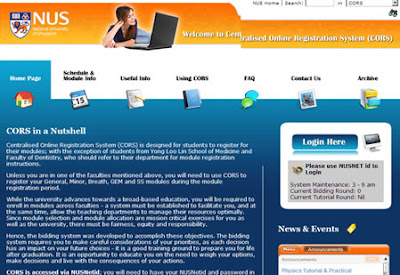
For some odd reason, the header's right side seems to going to break off anytime
Good luck to all bidders. Don't forget to read through these valuable CORS tips.
I'm through with CORS. The tactic works - Wait till 4:55pm and put in your points. Do not bid first (leave it at zero). Got all my modules with this tactic <evil laughter>. Oh no, did I just let out a tip? 
How to win (in) Centralized Online Registration System.
And I am not alone, judging by the increasing number of bidders in the last 15 minutes. And who doesn't want to? The other bidders for the module have the following considerations - They have very little time to make a decision in the last 15 minutes if the bidding gets too high
- They do not want to put too many points in it
- Many will not bother re-checking the bidders as they think the closed bidding period has not much to offer. This is GOOD in one way as there is a potential for you to increase your bid points and go over budget on seeing the number of bidders ballooning. BAD in a way that you could have used the points and module slot to bid for another module if they are too many bidders.
The fact is, the number of bidders play a BIG role. If the bidders are much more than the vacancies available, than you know you have to bid much higher due to the increased competition. Lower than vacancy, you will have to watch for Snipers (as they are known as in eBay; people who bid in the last minute). 
Needless to say, the F5 (Refresh) key is still used before close bidding. Image is stolen.
Next, the NUS Time Table Builder. Often linked to and praised about on how it has helped plan our semesters, this tool is indispensable. 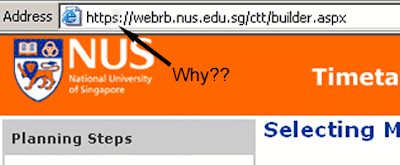
The NUS Timetable Builder
It uses HTTPS. Shh, somebody is going to find out what modules you are going to bid for. It is Top Secret! Encrypted with key length 1024-bits. Nearly undecipherable. Rest assured that nobody can break it within reasonable time. Raaaaight. My planning of the time table is very, very confidential. 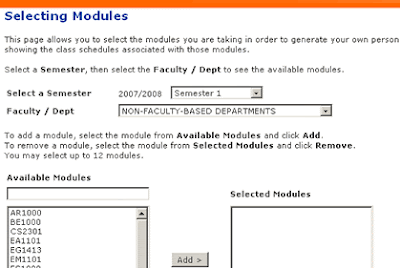
Step 1: Selecting Modules.
Now to select modules. Easy as pie. Select the faculty and add the modules as needed. There's only one problem. The correct semester. The system defaults to Semester 1 for one of the oddest reason I cannot imagine. Those who are used to planning the time tables repeatedly in semester 1 may forget to change the Semester box and end up with the wrong time tables. That's Problem 1. So for this semester, I plan to take CS1105 and CS1231. I also added CS1102Y and CS1102Z so that I can see how it fits into the time table and choose the best class. Hit "Next". 
Oh, a exam clash. That's OK, lets ignore and move on.
Looks like an exam clash. That's fine. Clashing exams will cause problems and cannot be added to CORS either. But since I am adding both of them only for comparison's sake, I click "Next". 
I *know* there's a clash. But I am OK with it!
Show stopper encountered. Problem 2. Now I have to manually generate two time tables to compare. I uncheck the first one and click "Next". 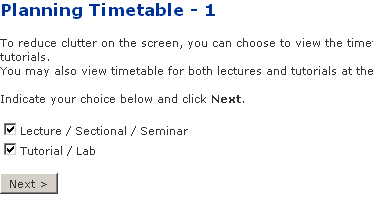
Now to select what to view.
It asks me whether I want to view only lectures and/or tutorials. I find myself always choosing both, so that I can plan tutorials as well. If many people are doing this, this screen should be skipped and provided as an option in the time table screen instead. Hitting "Next" showed me the generated time table. You can select the slots and keep hitting "Rebuild" to show an updated time table. Pretty good. This is where you try with different slots and tutorial slots to get the sleep-and-wake-up-late and 3-off-days-per-week dreams of every NUS student. 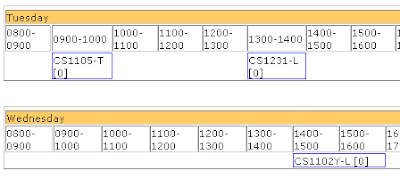
A partial screen shot of the generated timetable
Looks good, but CS1102Y seems to be alone. Oh well, lets see if I can replace it with another module. *digs through CORS listings*. *finds a module* MA1505! It is an 8am lecture module, but it'll help me normalize my waking time so that I do not end up waking up too late everyday. Now, how do I add the module to my beautifully customized lecture and tutorial slot timetable? *looks around the page* 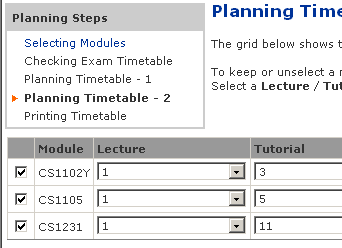
My beautifully customised time table. Now to add a module...
There is a blue link on the top left - "Selecting Modules". That should be it. *click* It brings me to the first page, without any modules selected. Click "Back". Heave a breath of relief on not losing any of the customized data. Quickly do a "Save As" in case something goes wrong. Now I try to hit the "Back" button to the module selection screen. It brings me to the first page again, without any modules selected. So there are no easy ways to add or remove modules other than repeating the whole process again. Problem 3. Neither can you plan a time table with modules that have clashing exam dates. Otherwise, it is still a very good tool. Happy New Year everybody.
The Centralized Online Registration System, the first barrier that all NUS students have to jump over before any semester starts. 
CORS! We meet again!
It comes with two bidding periods: - The open period where you will be able to view the highest, lowest and the next minimum bid.
- The closed period where you will not be able to view any of the above except for the number of bidders. You will be able to view the status of the bids as of before the closing periods in one very long HTML table.
From the official site: 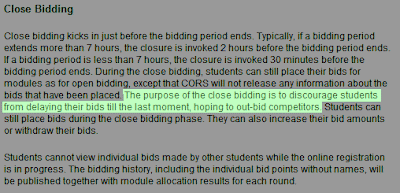
"The purpose of the close bidding is to discourage students from delaying their bids till the last moment, hoping to out-bid competitors"
So, what is stopping a student from doing these? - Place bids only during the closing period
- Place bids only during the last 5 minutes of the closing period to avoid updating the Number of Bidders
Basically, during the closing period, the bidder makes his best bid with the provided information at the end of the opening period. If all bidders follow the above 2 rules, the bidder has to make a maximum bid that he budgeted for the module. 
Imagine everyone keeps quiet until the last 5 minutes of the closed bidding period and then start submitting their bids.
I believe that the actual reason for the closing period is to prevent the system from getting overloaded during the last few minutes of a round. I have heard rumours from the seniors that the system gets very slow during the old times where there were no closing periods. And why not adopt these methods to fix the overload issue? - Convert the system to PHP - a very efficient and fast programming language as compared to the slow and bulky Java that is being used now. Or some other efficient language. Probable reason: Too much resources needed.
- Employ Grid Computing for handling server load, especially during the end times. It *looks* like the CORS system is managed on ONE server. Probable reason: Too much resources needed.
That's the main point - they want to save costs and not invest in more hardware or progamming time. They could have balanced the load between more than one server and even make attempts to optimize the code by switching over to PHP. 
Must save cost! Must solve problem! (Note: 3 images stolen from other sites)
So instead of doing the above, the CORS committee decided to save costs and switch to this luck-based closed bidding system. Ebay anyone? Yahoo Auctions? Imagine if they did like what NUS did to save costs, implement a closed bidding period for popular auctions. The 2 same exact above strategies can be used. Not to say that the CORS system sucks. It does its basic job brilliantly as long as the bidders don't exceed the number of vacancies. But this closing bidding period scheme... well, you get the idea.
(Updated 2/Aug/07) Well, it has been long since an update due to the study break and me trying to make a few bucks. - Freshmen Orientation is 85% games, 15% NUS information

The official site of the Freshmen Orientation Project
See my rant here. Don't attend if you are not into funny games, selling flags or more games!
See the official site or just see the agenda for the Freshmen Orientation Week for this year. - NUS tendered laptops suck (UPDATE 2/Aug/07: Except for the Fujitsu's - see bottom of post). Yes, including those laptops that will be on sale in Matriculation Fair.

Dell offers a wide range of laptops, but do not order them online
For the best bang for the buck, call Dell's corporate line at 1800 3947419 ext 5456 (Dell Corporate - Christina You). Make sure you tell them you are a NUS student and you will get pretty good deals. I got my laptop with more than SG$500 savings.
If you have noticed, NONE of the laptops in the NUS tender have any gaming cards in them. Not a issue if you don't play games but it is a nice extra to have. You can't even upgrade to them as NUS does not allow it for some unknown reason.
Dell is a well known brand, normally assigned to value-for-money and a OK design brand. Of course, if you have the $$$, go for the likes of Sony. But with the 3 year on-site warranty that I got from Dell, I have no regrets. And my laptop required servicing once every 4 months for odd problems.
Also, avoid Windows Vista unless you are able to deal with more problems. If no choice, get the system with Vista. When you finally get a mySOC ID, download Windows XP Service Pack 2 from SOC Internet. It is legal and genuine, as part of Microsoft Academic Program. Hopefully, mySOC still allows it for download and not removed it in place of Vista.
UPDATE 2/Aug/07
Now that the new laptop specs are out, Fujitsu deals are not that bad. They even have a model with a dedicated graphic card. Unfortunately, it is a 15" monster so if size is a concern, the Dell XPS M1210 / M1310 still stands out with its dedicated graphics card.
Also, avoid notebooks that only come with on-campus servicing, especially if you are staying far away from NUS. Go for on-site services where possible for convenience. I had a friend who had to wait more than 1 month for IBM (or Lenovo) to replace a laptop's noisy fan. Lousy on-campus service? You decide.
And go for 2GB RAM where possible, especially if you do programming using Java - a virtual machine that needs lots of RAM.
Finally, understand what you really need. Lugging around a 15 inch laptop everyday to NUS is not going to be a pleasant affair. Games like Maple Story do not require a dedicated graphic card. Ask around. Remember, if you buy from an external party, you miss out all the Adobe, Office 2007 and Windows Vista (<gulp>, more problems) freebies. Here's a full article on the NUS laptops to help you more. - Don't take exemption tests such as MA1301 Introductory Mathematics (for poly students)

No labs, no projects! Who says it's not hard to get MCs?
Did you know that you do not get any modular credits for passing it? Not even a grade! You will just be certifying yourself that you already have the knowledge of MA1301 so that you can take other modules which have it as a pre-requisite.
What's in it for me? Because if you take this as a module, you will get 4 modular credits AND a grade that can push your CAP! Not to mention you complete one Breadth (or Unrestricted Elective, whichever you choose). Even more, you will only need to attend the 1 hr tutorials every week and show your grinning face to get the full attendance score. Just make sure you know your stuff.
Personally, I do not know why CS1231 (Discrete Structures) requires this when every single person I spoke to (that took CS1231) says that it does not use any concepts from MA1301.
Be sure you know your stuff. This could hit back at you if you are not good in the concepts and even pull down your CAP.
More info on the MA1301 Proficiency Test. See the MA1301 module information. - Get to know the CORS system

Meet MR. CORS. Be prepared to verify your home address numerous times (everytime you login ;)
Its not really that complicated - some of them make it so. Find an approachable same-sex (so you don't get distracted heh) senior in the first day of the orientation week and pour all your questions.
The best time is during those times when there's some boring lecture going on - there was one advertising a module about making games so use it to discuss with your senior in a quiet corner so as to not to cause a disturbance.
My personal advice - take the core CS modules first as you are given "protection" - in the form of freshmen-only places - from us seniors as many of us have much more points that you do.
Visit the CORS website. - Read this blog!

It won't take long to adjust. Thankfully, there are no tutorials/labs for most modules in the first 2 weeks.
But seriously, there are some useful links splattered throughout the blog. Here are some links that should help you out (in addition to the ones above):
- Timetable Builder - Use this to plan your modules. Consider travel times between faculties, lunch and off-days where possible.
https://webrb.nus.edu.sg/ctt/builder.aspx
- Module Information Site 1
http://www.cors.nus.edu.sg/CorsSchedule/moduleInfo.html
- Module Information Site 2 (in case the previous goes down - it happens, replace XXX with module code)
https://ivle7.nus.edu.sg/nus/modules/mview.asp?acad_y=2007/2008&mod_c=XXX
- Module Information Site 3 (SOC modules only - click on the module code in the 1st column for more info on a module)
http://www.comp.nus.edu.sg/~online/course_list/
- NUS E-Mail - Important NUS circulars, CORS results and NUS spam
https://exchange.nus.edu.sg
- NUS Friendly Mail - Convert your u0706xxx@nus.edu.sg to something like bertsimpson@nus.edu.sg!
http://www.nus.edu.sg/fea/
- Integrated Virtual Learning Environment - For all module related information
https://ivle.nus.edu.sg
- Used Textbooks Forum - Don't skimp on text books
Offhand I have forgotten the link? If anyone knows it, please post in the comments.
Update 2/Aug/07 - http://ivle.nus.edu.sg/forum/forum.aspx?ForumID={5ec4b811-0ef4-4095-82d4-171e3d61c97c} (requires IVLE login)
Well that is all that comes to my mind for now.
Post in the comments if you want to add on for your juniors (if you are a senior reading this)! Don't forget to start bidding on 30th July 2007! Mark it on your calendar! You can check the bidding schedule here.
The holidays are almost over! I've just checked the Exam Results site for my New Year present from NUS. Well, I can say it has been a bad start. As usual I plough through the summary of degree requirements, Timetable Builder and Module Information (computing modules mirror). So now, back to meeting Mr. CORS. Been a long time since I saw you ol' buddy. The last time I saw you was during tutorial registration. And I see you have been up to some extra irritating things again. - The Dreaded Login Screen
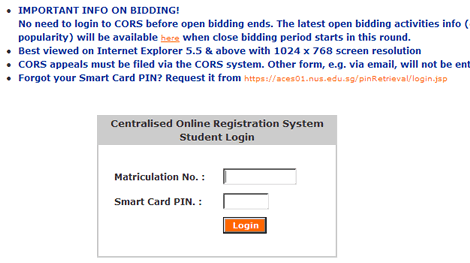
I meet the login screen again. Doesn't support IE's AutoComplete. Doesn't support "Remember Me". Did I mention that this screen forced me to open it in a new window?
- Having to confirm my address *everytime* I login

Seriously, I've checked the address 1,384,493,943 times and it is correct. I will inform the Admin Registar if Osama decides to kidnap me. You have my word, Mr. CORS.
-
Not Allowing Me to view any Module Information (Irritation of the Year Award ?????) 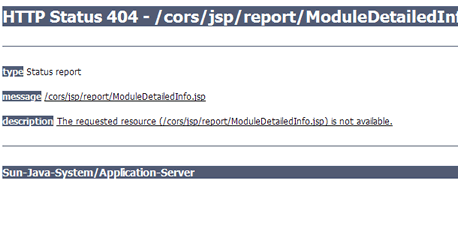
From http://www.cors.nus.edu.sg/CorsSchedule/moduleInfo.html, I click on Faculty Modules, and get presented with the above screen. Is this really needed during the bidding period? And it has been happening for 2 days.
Luckily, there's the SOC Course List for SOC modules. Clicking the course code shows the pre-requisites and other info.
For SS and UE's outside faculty, I have to LL and ask around.
Happy Bidding, fellow colleagues. Just don't compete with me :-)
Normally, I use my Outlook to reply to e-mails. Today, I happened to be in the lab and I had to use the web interface to reply to an e-mail. Again, I had to login, even though I am logged in onto NUSNET already. 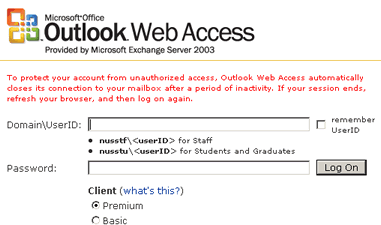 Implement a standard login page for all systems! Implement a standard login page for all systems!
I kept entering the password when the focus was at "remember UserID" as I am used to pressing "Tab" after entering my username . Then I realised that its because that "remember UserID" should be placed after the Password box and not before it. Again, a special NUS only irritating feature :-/ Anyway, I proceeded to log in. The interface was almost similar to Microsoft Outlook. I knew immediately what to do to create a new mail. I click New Mail, spent about 10 minutes typing out a message... 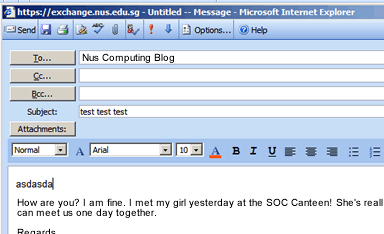
Almost like using Microsoft Outlook! Now after hitting the Send button... 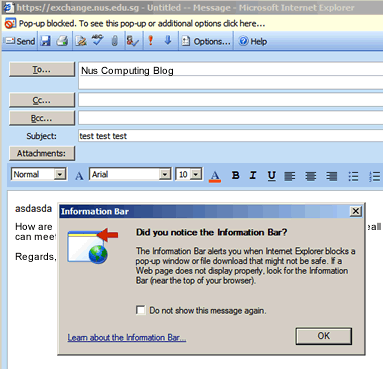
Ah, a popup that IE is blocking. Gotta allow it. Easy, just right-click the yellow bar... 
and allow the pop-up... 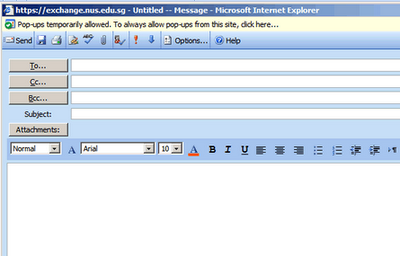
The window refreshes and... my message..! Where's my message?! My 10 minute long message! Unfortunately, this was one of those rare times where I forgot to hit Ctrl+C before hitting the Send button. NUS CORS Tutorial Balloting It's bad enough that I have to ballot for my tutorials. After spending 15 minutes to select 22 tutorial slots that I was able to fit in my time table, I finally hit the Next button. And I get presented with this error message. 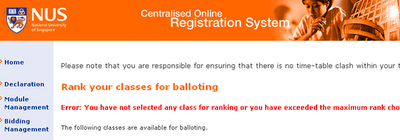
Seems that I can only select a maximum of 20 classes. Why wasn't there at least a JavaScript function to check this requirement on the first page itself?
OK, I scroll down. Guess what I saw? All the checkboxes cleared. (None checked)
That's right, I spent 15 minutes carefully selecting tutorial slots, and one error message destroyed all my efforts for that period. I had to recheck, and manually count them by hand again. Test a system with many users before releasing it - this way, you get problems and suggestions from the user's point of view, not from a developer's point of view.
CORS. Centralized Online Registration System. So many irritations. So many problems. Here comes Part 2.
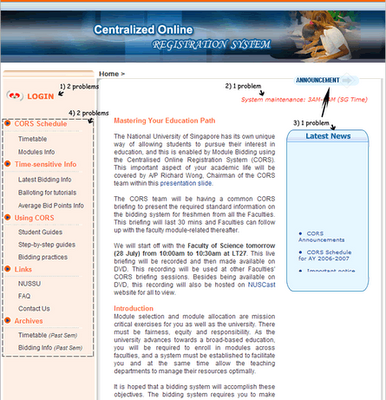 Below I match the Problem Number to Problem Description. Eg. Number 1 points to Number 1 in the image above
Below I match the Problem Number to Problem Description. Eg. Number 1 points to Number 1 in the image above
- Login page is another Page. See (NOTE1) below
Why can't the link be in the front page? Like IVLE. See (NOTE1) below for the 2nd problem.
- System is under maintenance everyday from 3AM - 6AM?
Don't put alerts for events that don't happen.
- Okay! What's today's latest news? (wait 5 seconds for news to scroll by) Oh no, I missed that line! Now I have to wait for the ticker to repeat itself!
Please don't use auto scrollers for news updates. I know how to use the wheel in my mouse - thank you very much.
And what is the difference between Latest News and Announcements? See (NOTE1) below for the 2nd problem.
- See (NOTE1). See (NOTE1).
NOTE1 Don't Open Links in New Windows! EVER! (Link to usability expert Jakob Nielson's advise) Please stop setting the target of the links to _Blank. It is very annoying when a link opens a new window. And with the JavaScript usage on the CORS page, I can't use the IE Cheat Code of dragging the link to the address bar to bypass a new window. Nice JavaScript. Bad Usability. And there's more Let's find out about Module Information. So I click on Modules Info, which bring me to this link. https://aces01.nus.edu.sg/cors/jsp/report/ModuleInfoListing.jsp A HTTPS page. Great. And a very long one on that. On my home connection, I need to wait 5 minutes for it to complete loading. After loading, you get the list of modules in the whole of NUS and the contents are such that you do not need to refer to the header more than once. Now, lets take a look at Bidding Statistics at End of Open Bidding http://www.cors.nus.edu.sg/Time-sensitive/openbid_2A_20062007s1.html And it shows me this page. Easy. 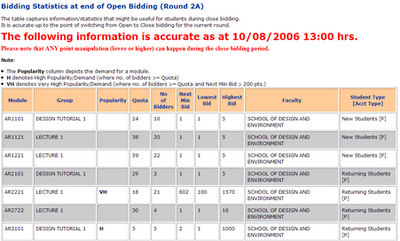
OK, let's find how CS1104 Computer Organisation fared. I did a Find, and got this screen. 
Right. Now what were the titles of the column. *scroll back up* *scroll back down*. What about CS1101? Find again, get the titles, shit I forgot the column headers, *scroll back up* *scroll back down*. Get the point? The headers need to be fixed (not moving with the document) for the table as the column headers are too much for a person to keep track of. Make the intranet an enjoyable system, not a frustrating one to use.
|

















































